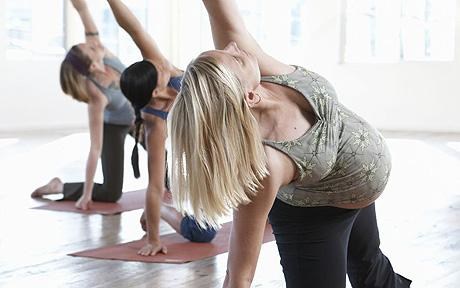While most us feel extremely blessed when pregnant, such a gift does come hand in hand with its challenges. Even those of us with moderately good self esteem can begin to worry unnecessarily, mostly due to raging hormones and fatigue, whether our bodies will ever look the same again. There were days where I would wonder if my body intended to store enough fat to feed an entire tribe of babies, rather then just one small baby.
For most women (excluding those with High Blood Pressure or Diabetes where specific guidance is necessary please see below), it is okay to continue with your normal exercise routine (with slight modifications) or to introduce mild to moderate exercise.
Exercise during pregnancy has a number of health benefits for you and your baby. So you might like to start a walking group or a swimming group with some other pregnant women. Perhaps in addition to your normal exercise routine you might like to introduce some Yoga? There are many yoga classes dedicated to pregnant mothers and it can be a very social and grounding experience. Group activities prevent us from being so insular and one quickly realises that women come in all shapes and sizes, as do the little miracles they are carrying.
Some of the benefits of exercising whilst pregnant are highlighted below.
THE BENEFITS OF EXERCISE FOR PREGNANT WOMEN.
According to a GREAT many studies, exercise during pregnancy is extremely valuable for a number of reasons:
- A pregnant woman will have more energy, more restful sleep, better stress management and less mood swings.(1)
- Women who exercise while pregnant gain 21% less weight and have an improved attitude over sedentary pregnant women.(2)
- 80% of women who exercise during pregnancy gave birth on or before their due date.(3)
- Moderate exercise increases placental function and growth (vigorous exercise causes a decreased size at birth and is not recommended).(4)
- Exercise helps to improve the flow of blood and oxygen to your baby’s brain. Babies tend to be more alert, calm and more responsive to stimuli.(5)
- Studies have also proven that women who exercise have shorter, easier labours (decreased by an average of two hours), less medical intervention(24% less caesareans and 14% reduced use of forceps), less foetal distress and a faster recovery. There is alsoless need for induced labours or epidurals.(6)
- The changes to your cardiovascular system during pregnancy as a result of exercise enable a greater flow of nutrients and oxygen to your baby. These beneficial changes include a 40% increase in maternal blood volume and a heart rate increase of 15 beats per minute (bpm).(7)
EXERCISE GUIDELINES

Expectant mothers should not worry that exercise will hurt their babies.
- Simply ensure that you measure your heart rate (HR) at the peak of activity; a heart rate kept under 140-150bpm has wonderful benefits to offer. Studies have shown that foetal distress occurs only if the maternal HR exceeds 180bpm.(8)
- Moderately intense aerobic exercise should be limited to 15–20 minute periods and low intensity exercise should not exceed 45 minutes in total.(9)
- A pregnant woman should also drink plenty of water before and after exercise to prevent dehydration.
- During pregnancy, choose an exercise that will not affect your centre of gravity.
For example, as your belly grows bigger, opt for walking up a hill along a footpath rather than an inclined tread mill. Walking, swimming, stationary bicycles, water aerobics and low impact aerobic classes designed for pregnant women are mild and wonderful forms of exercise.
Stretching is also vital for relieving general aches and keeping the body flexible. Again, Yoga is fantastic exercise during pregnancy, not only for the physical benefits of strengthening and stretching but also the discipline of breath control and mind-body connection.
There are many yoga classes available for pregnant women at healthcentres. They are also available on DVD and video.
WHO SHOULD AVOID EXERCISE OR SEEK FURTHER ADVICE?
Exercise is contraindicated for women who have high blood pressure, cardiovascular disease, vaginal bleeding, pre-term rupture of membranes, history of incompetent cervix or premature labour, foetal complications, anaemia, diabetes, sickle cell anaemia and thyroid disease.(10)
If you suffer with one of the above conditions, please seek advice before initiating an exercise regime. Ask your carers for suggestions as there may be some forms of gentle exercise you can safely partake in. If you are advised to refrain from exercise entirely then I would suggest that you surrender to the clear messages from your body that it needs complete rest and choose to enjoy this time. Decide to keep yourself as healthy as possible by feeding your mind and body with wholesome things. Life will be busy enough when your little arrives.
. . . . .
 For more information about Pregnancy, Birth & Beyond,
For more information about Pregnancy, Birth & Beyond,
please refer to Well Adjusted Babies — which includes
Jennifer’s well-researched, easy-to-read information about…
 Improving Fertility Improving Fertility                                                                                          |
                                                                                                         |
Take a look at Well Adjusted Babies here.
References
2) Clapp JF 3rd. Little KD. Effective Recreational Exercise on Pregnancy, Weight Gain and subcutaneous fat deposition. Med Sci Sports Exercise. 1995:27;170-177.
3) Clapp JF 3rd. Dickstein S. Endurance Exercise and Pregnancy Outcome. Med Sci Sports Exercise. 1984:16;556-562.
4) Clapp JF 3rd. Kim H. Burciu B. Lopez B. Beginning Regular Exercise in Early Pregnancy: Effect on Fetoplacental Growth. Am J Obstet Gyn. 2000:183;14841488.
5) Clapp JF 3rd. Morphometric and Neurodevelopment Outcome at Age Five Years of the Offspring of Women who Continued to Exercise Regularly Throughout Pregnancy. J Pediat. 1996;129:856-863.
6) Anderson C DC. Exercise and Pregnancy. ICA Review: Spring/Summer; 2004. (pg. 52-61)
7) Clapp JF 3rd. Exercise During Pregnancy. A Clinical Update. Clin Sports Med. 2000:19;273-286.
8-10) Anderson C DC. Exercise and Pregnancy. ICA Review: Spring/Summer; 2004. (pg. 52-61)


 For more information about Pregnancy, Birth & Beyond,
For more information about Pregnancy, Birth & Beyond,